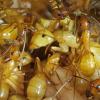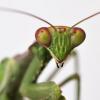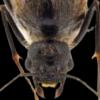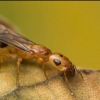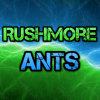Something to keep in mind is that any creature that routinely eats fruits or sugary substances is going to run into fermented juices.
The chief issue I raised was with respect to using any live and active fermenting liquid in larger gravity liquid feeders, because the gas production will force the liquid out. While I haven't seen any evidence that ethanol has a phagostimulatory effect on ants, I do know that ants are repelled by ethanol at higher concentrations.
In the past, I actually tried adding a small amount of ethanol to Sunburst Ant Nectar in an attempt to reduce the active water concentration (acting as a preservative), and even a small amount of ethanol made the solution less attractive to ants. Ants and other animals are likely to continue eating fruits and liquids undergoing fermentation in the wild by virtue of the fact that sugar is a scarce resource to begin with, while animals with chewing mouthparts may also benefit from easier digestion of these decomposing foodstuffs.
Another issue with relying on fermentation to produce quality liquids to which ants are receptive, is that fermentation is an inexact science and extremely difficult to replicate—and that's putting things kindly. Think of all the fermented wines, beers, and other beverages in the world. Most antkeepers want sugary liquids to perform reliably and consistently every time, which would be the complete opposite of any liquid produced with the aid of fermentation.
These products are made of essential oils (ProHealth= lecithin [emulsifier], EO of spearmint, EO of lemongrass, and EO thymol) and they really lengthen feed-life and are safe for the bees when used/mixed properly. Are there similar products for ants?
Many types of volatile plant compounds repel ants. If you conducted very careful and controlled experiments on ants with these compounds, you would likely be among the first to do so.
For what it’s worth I’ve fed colonies fermented honey water without issue in the past. They even seemed to enjoy it more when they would start to get bored of fresh mixtures.
I disagree with the idea that ants become "bored" with different sugar solutions; there must be a less arbitrary reason for why ants would be attracted to solution A over B. If the workers are more receptive to one solution over another based on composition alone—which can best be determined by offering foods simultaneously to a large sample size of colonies—you should be able to replicate the more attractive solution and retain the advantages it has over the other solution so that it is preferred every time, rather than on irregular occasions.
Edited by drtrmiller, February 22 2019 - 12:01 PM.






